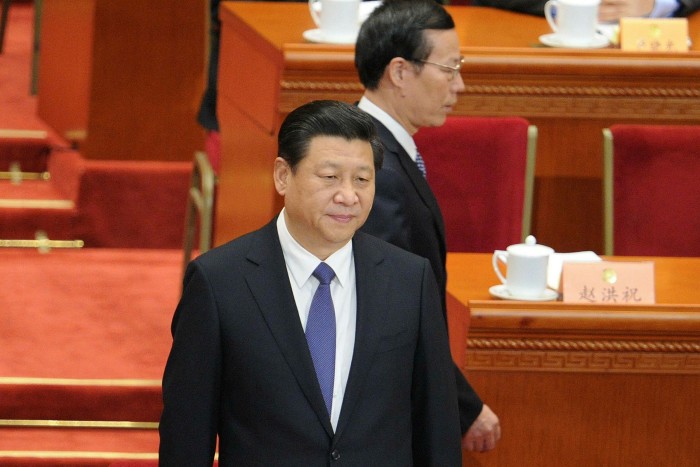Zhang Gaoli might have been remembered as a reform-focused cadre who played his part in facilitating China’s rise from poverty and who represented a rejuvenated nation, even holding talks with Barack Obama and Vladimir Putin.
But a sexual assault allegation levelled by tennis star Peng Shuai has embroiled the 75-year-old in an international #MeToo furore and focused attention on the secretive network of alliances at the top echelons of the Chinese Communist party.
The question facing Zhang is whether the scandal stems from an individual and will ultimately be erased from history by state censors, or whether it will become the basis of a prolonged attack by rivals to topple his network of influential allies.
Throughout its 100-year history, the CCP has demonstrated that lines of patronage and loyalty, rather than merit or wrongdoing, ultimately decide whether an official rises or falls. The ill fortunes of one high-ranking official can bode poorly for the cadres closest to them.
The party’s internal disciplinary organ, the Central Commission for Discipline Inspection, also has a record of accusing elites of sexual misconduct during purges.
Under President Xi Jinping, conflicts between factions are “much weaker” than in earlier periods, when ruthless power struggles in the CCP spilled into the public sphere, according to a China-focused academic, who wished to remain anonymous.
“But it hasn’t disappeared. People are just afraid to talk about it,” he said.

Peng went missing from public view this month after accusing Zhang, 40 years her senior, of sexually assaulting her on at least one occasion in Tianjin, the city where he held a senior party position from 2007 to 2012.
The three-time Olympian’s reappearance via a controlled series of state media videos and a carefully worded statement from the International Olympic Committee has heightened scrutiny ahead of Beijing’s Winter Olympics in February.
But Peng’s plight might be unavoidably entangled in the ruthless power games played at the top of the Chinese government.
“If there are ‘political factors’ at play, then Peng’s situation becomes much more complicated, and for the regime, the international public relations aspect diminishes in significance,” said Jonathan Sullivan, director of the University of Nottingham’s China Policy Institute.
“They don’t want this international PR disaster right before an Olympics that looks likely to be complicated anyway but when it comes down to it, regime stability trumps everything,” he said.
Zhang’s term on the politburo standing committee, China’s top political body, ended in 2017 and his post as vice-premier a year later. However, clues as to Zhang’s future might lie in ties formed decades ago, in the halcyon days of China’s economic development.
Zhang began his career with a state petroleum group in Guangdong, southern China. Through the 1970s and early 1980s, he progressed from work as a porter and personal secretary to head the company’s planning department.
During the late 1980s and into the 1990s, he led Guangdong’s economic commission before serving nearly 10 years as the province’s vice-governor and four as party secretary of Shenzhen, the heart of China’s tech industry.
As he advanced through the party ranks, he was “widely considered to be a protégé of Jiang Zemin and Zeng Qinghong”, according to a profile by Cheng Li, an expert on the party leadership at the Brookings Institution.
Jiang was China’s president after Deng Xiaoping. Zeng was Jiang’s vice-president and his right-hand man. While immensely powerful in their prime, their influence appears to have waned under Xi.
But Jiang has remained a “unifying point” for various cliques within the party, the China academic said. “There are a lot of different groups that have nothing in common except their potential opposition to Xi Jinping. That is why Jiang Zemin is so important.”
Zhang was linked to leading business figures, including Hong Kong tycoon Li Ka-shing. According to Brookings’ Cheng, Zhang married a classmate from Xiamen University. Their daughter married the son of Lee Yin Yee, a wealthy Hong Kong businessman.
He was involved state land deals with groups including Evergrande and Fantasia, noted analysts at Cercius Group, a Montreal-based consultancy specialising in Chinese elite politics. The two are among China’s most heavily indebted property groups, both headquartered in Shenzhen, now battling for survival.
While Zhang was not considered a rival to Xi by the time he took over as president in 2012, his broader network of relationships might now prove pivotal to his future.
According to Cercius, Zhang had “nothing to do with Xi — he of course ‘played ball’ . . . but that is it”.
“Zhang was never said to be an ally of Xi in the academic field of Chinese elite literature, nor in the Taiwanese Chinese-elite literature, or even in the Hong Kong based analysis . . . Zhang is pure ‘jiang-pai’”, the consultancy said, referring to the informal name given to the elite faction loyal to Jiang Zemin.
Victor Shih, an associate professor at the University of California San Diego, noted that Zhang worked for years with politburo members Li Hongzhong and Zhao Kezhi, the minister of public security.
“Of course, in this case, Zhao Kezhi’s help would be crucial,” said Shih.
Zhang’s seniority meant he also promoted others, meaning a broader group of now-rising officials might be affected by his potential downfall, experts said.
Shih suggests this list might include Liu Kun, minister of finance; Wang Menghui, minister of housing and urban development; Niu Yibing, vice-director of the powerful internet watchdog Cyberspace Administration of China; and Zheng Yanxiong, chief of Hong Kong’s new national security office.
Still, experts remain unsure whether the allegations against Zhang will be enough to topple him.
“Of course, you have to unleash the censor apparatus to show that ‘we are protecting our own’,” Cercius analysts said of the reaction to Peng’s initial social media post. “But in reality, Xi now has the momentum to punish Zhang if he wants to.”
Peng Shuai’s assault allegation focuses attention on China’s elite political factions
Pinoy Variant